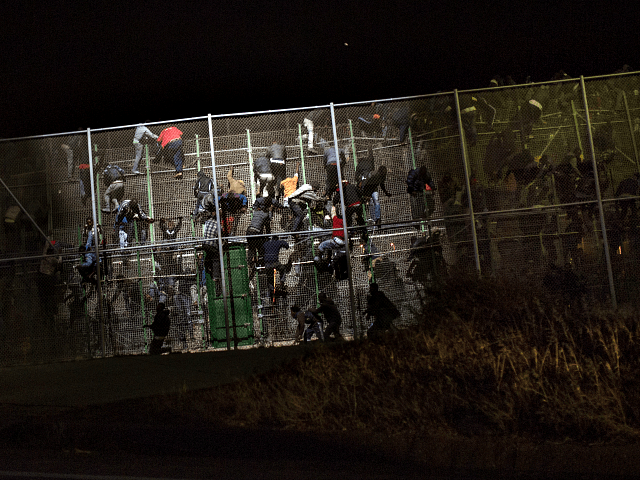Border violations have tripled at Ceuta and Melilla, twin cities on the North African coast which have been Spanish for hundreds of years. The increase follows Moroccan threats to terminate security co-operation.
A group of over a thousand migrants launched an “extremely violent and organised” assault on Ceuta’s border fences in January 2017, injuring some fifty-five officers – one of whom lost an eye.
El Pais reports how, the following month, Moroccan agriculture minister Aziz Akhannouch issued a statement declaring that if the European Union (EU) will not give in to the North African dictatorship in disputes related to farming, fishing, and the illegal occupation of Western Sahara, “migration flows” to the Spanish exclaves may no longer be contained.
“How do you expect us to do the work of blocking African and even Moroccan emigration if Europe doesn’t want to work with us?” asked the billionaire oil and gas tycoon. “Why should we continue acting as police and giving [migrants] work?”
The EU does, in fact, funnel “tens of millions of euros” to the Moroccan king to encourage him to stem the flow of illegal migration, with the Moroccan authorities frequently accused of using a “shocking” level of violence to do so.
Nevertheless, on the same day Akhannouch issued his statement, 18 migrants were made it over the fences around Melilla, allowing them to lodge asylum claims on EU soil.
On 18 February, 15 officers were reported injured when some 500 migrants breached the fences. Another 300 broke through just days later, out of a group of around 500 to 600 who had charged the border with “tools and clubs”.
Despite the threats and the sharp uptick in border violations, Spain’s official position is that Morocco continues to co-operate “impeccably”.
El Pais quotes a member of the Civil Guard who claims to have seen groups of migrants being allowed to pass Moroccan military camps and cut through the border fence unmolested, however, and a spokesman for the AUGC Civil Guard labour union also alleges that “Morocco has slowed down a lot … in terms of cooperation”.
Mohamed Salem Salek, foreign minister representing the partially recognised Saharawi Arab Democratic Republic, told El Pais: “It is absolutely impossible for a large group of people to gather near the bay in Ceuta or Melilla without the [Moroccan] gendarmes giving them the green light.”
According to Salek, the escalating border violations are “the result of the policy of complicity … Europe has allowed Morocco to behave as it likes.”
Despite the deteriorating security situation in Ceuta and Melilla, Spain’s nominally conservative prime minister, Mariano Rajoy, recently declared that he “did not believe in borders”, in an apparent swipe at U.S. President Donald J. Trump.
President Trump was elected on a strong borders platform , which ruffled feathers in the EU.

COMMENTS
Please let us know if you're having issues with commenting.